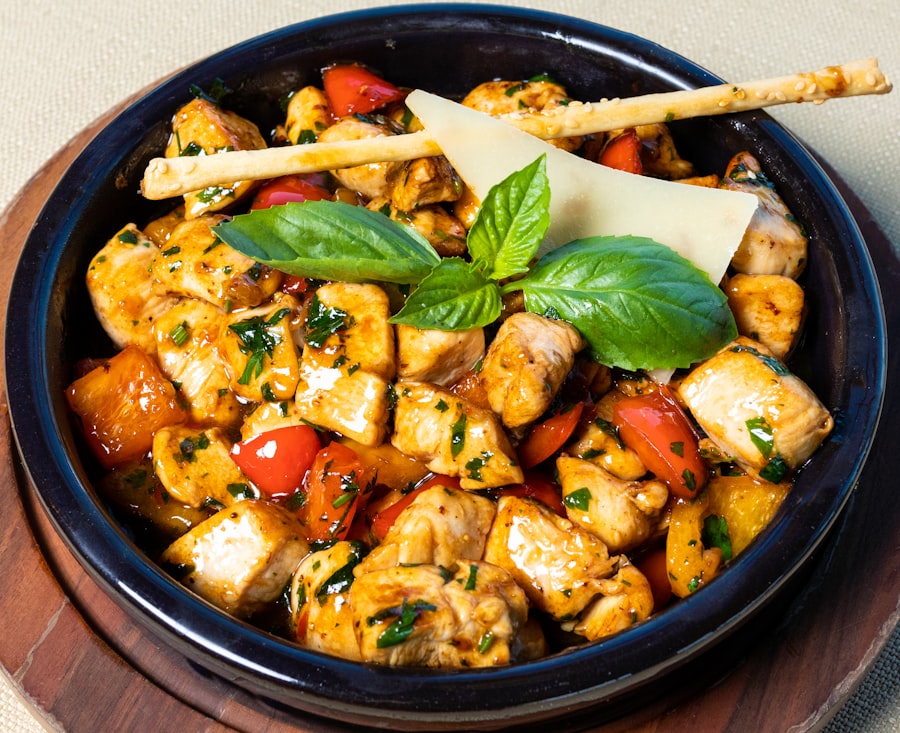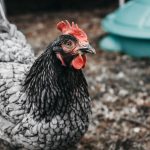Keeping chickens and parrots together can provide several advantages for both the birds and their caretakers. The diverse aviary environment created by combining these species offers enhanced stimulation and enrichment for the birds. Chickens and parrots exhibit distinct behaviors and habits, making their interactions potentially interesting to observe.
This mixed-species setup can contribute to improved mental well-being for the birds through increased environmental complexity. For owners, maintaining a combined chicken and parrot habitat can be beneficial in multiple ways. Both species are known for their capacity to form strong bonds with humans, potentially leading to more varied and meaningful interactions for the caretaker.
Additionally, housing chickens and parrots together can be an efficient use of space for those interested in keeping multiple bird species but facing spatial constraints. This arrangement allows for the creation of a diverse avian community within a single enclosure, offering a unique and potentially rewarding experience for bird enthusiasts.
Table of Contents
- 1 Understanding the Compatibility of Chickens and Parrots
- 2 Creating a Safe and Stimulating Environment for Chickens and Parrots
- 3 Providing Proper Nutrition for Chickens and Parrots
- 4 Managing the Social Dynamics between Chickens and Parrots
- 5 Addressing Health and Hygiene Concerns when Keeping Chickens and Parrots Together
- 6 Potential Challenges and Solutions for Keeping Chickens and Parrots Together
- 7 FAQs
- 7.1 Can chickens and parrots be kept together?
- 7.2 What are the considerations for keeping chickens and parrots together?
- 7.3 What are the potential challenges of keeping chickens and parrots together?
- 7.4 Are there any health concerns when keeping chickens and parrots together?
- 7.5 What are some tips for keeping chickens and parrots together?
Key Takeaways
- Keeping chickens and parrots together can provide companionship and entertainment for both species.
- Chickens and parrots can have compatible social dynamics if introduced properly and given enough space.
- Creating a safe and stimulating environment involves providing perches, hiding spots, and separate feeding areas for chickens and parrots.
- Proper nutrition for chickens and parrots includes a balanced diet of seeds, fruits, vegetables, and insects.
- Managing social dynamics between chickens and parrots requires monitoring for any signs of aggression and providing separate resting areas.
Understanding the Compatibility of Chickens and Parrots
Size Matters
One key factor to consider is the size of the birds. Chickens are generally larger and more robust than parrots, so it is important to ensure that the parrots have enough space to retreat to if they feel threatened. Additionally, it is crucial to provide plenty of perches and elevated spaces for the parrots to escape to if needed.
Understanding Natural Behaviors
Understanding the natural behaviors and instincts of both chickens and parrots is essential for creating a harmonious living environment for both species.
Creating a Harmonious Environment
By taking into account the size and natural behaviors of both species, you can create a peaceful and thriving environment where chickens and parrots can coexist happily.
Creating a Safe and Stimulating Environment for Chickens and Parrots

Creating a safe and stimulating environment is crucial when keeping chickens and parrots together. Providing a spacious aviary with plenty of perches, branches, and hiding spots is essential for the well-being of both species. It is important to ensure that the aviary is secure and predator-proof to protect the birds from potential threats.
In addition to physical enrichment, mental stimulation is also important for the overall health of chickens and parrots. Providing toys, puzzles, and foraging opportunities can help keep the birds mentally engaged and prevent boredom. Furthermore, offering a variety of natural materials such as branches, leaves, and grasses can provide opportunities for both species to engage in natural behaviors such as pecking, scratching, and exploring.
Providing Proper Nutrition for Chickens and Parrots
Proper nutrition is essential for the health and well-being of chickens and parrots. Both species have specific dietary requirements that need to be met in order to thrive. Chickens are omnivores that require a balanced diet of grains, seeds, fruits, vegetables, and protein sources such as insects or mealworms.
On the other hand, parrots are primarily herbivores that require a diet rich in fruits, vegetables, nuts, seeds, and pellets. When keeping chickens and parrots together, it is important to ensure that both species have access to their specific dietary needs. This may involve providing separate feeding stations or using feeders that are designed to accommodate different types of food.
Additionally, it is important to monitor the birds’ food intake to ensure that they are receiving the appropriate nutrients and are not being outcompeted by the other species.
Managing the social dynamics between chickens and parrots is essential for maintaining a harmonious living environment. Chickens are hierarchical animals that establish pecking orders within their flock, while parrots are highly social creatures that form strong bonds with their flock mates. Understanding these social dynamics is important for preventing conflicts between the two species.
One way to manage social dynamics is to provide plenty of space and resources to prevent competition between the birds. This may involve providing multiple feeding stations, perches, and hiding spots to ensure that each bird has access to what they need. Additionally, observing the birds’ behavior and intervening if necessary can help prevent conflicts from escalating.
Addressing Health and Hygiene Concerns when Keeping Chickens and Parrots Together

Preventing Disease Transmission
Regular cleaning of the aviary, including removing droppings, replacing bedding, and disinfecting surfaces, can help minimize the risk of disease transmission.
Monitoring Health and Well-being
Furthermore, it is important to monitor the birds for signs of illness or distress and seek veterinary care if necessary.
Providing Preventative Care
Providing regular health checks and preventative care, such as vaccinations and parasite control, can help ensure that both chickens and parrots remain healthy and thriving in their shared environment.
Potential Challenges and Solutions for Keeping Chickens and Parrots Together
While keeping chickens and parrots together can offer many benefits, there are also potential challenges that may arise. One common challenge is managing the different dietary needs of both species. This can be addressed by providing separate feeding stations or using feeders that accommodate different types of food.
Another challenge is preventing conflicts between the birds, especially if there is a significant size difference between the chickens and parrots. Providing plenty of space, perches, and hiding spots can help prevent conflicts from escalating. Additionally, monitoring the birds’ behavior and intervening if necessary can help maintain a peaceful living environment.
In conclusion, keeping chickens and parrots together can offer a range of benefits for both the animals and their owners. By understanding the compatibility of these two bird species and creating a safe and stimulating environment, it is possible to create a harmonious living environment where both chickens and parrots can thrive. With proper nutrition, management of social dynamics, and addressing health and hygiene concerns, it is possible to overcome potential challenges and create a rewarding experience for both the birds and their owners.
If you’re considering keeping chickens and parrots together, you may want to read the article “Where to Put Chicken Coop” on PoultryWizard.com. This article offers valuable insights into the best location for your chicken coop, which is essential for creating a harmonious environment for both chickens and parrots. Check it out here.
FAQs
Can chickens and parrots be kept together?
Yes, chickens and parrots can be kept together in the same space, but it is important to consider their individual needs and behaviors to ensure they can coexist peacefully.
What are the considerations for keeping chickens and parrots together?
When keeping chickens and parrots together, it is important to provide separate areas for each species to roost, nest, and feed. Additionally, it is important to monitor their interactions to ensure that they are not aggressive towards each other.
What are the potential challenges of keeping chickens and parrots together?
One potential challenge of keeping chickens and parrots together is that they have different dietary needs. Chickens require a diet high in protein, while parrots require a diet high in fruits, vegetables, and nuts. It is important to ensure that both species are receiving the appropriate nutrition.
Are there any health concerns when keeping chickens and parrots together?
There are potential health concerns when keeping chickens and parrots together, as they can transmit diseases to each other. It is important to monitor their health and seek veterinary care if any signs of illness are observed.
What are some tips for keeping chickens and parrots together?
Some tips for keeping chickens and parrots together include providing separate areas for each species to roost and nest, monitoring their interactions, and ensuring that they are receiving the appropriate nutrition. It is also important to provide enrichment activities for both species to prevent boredom and aggression.
Meet Walter, the feathered-friend fanatic of Florida! Nestled in the sunshine state, Walter struts through life with his feathered companions, clucking his way to happiness. With a coop that’s fancier than a five-star hotel, he’s the Don Juan of the chicken world. When he’s not teaching his hens to do the cha-cha, you’ll find him in a heated debate with his prized rooster, Sir Clucks-a-Lot. Walter’s poultry passion is no yolk; he’s the sunny-side-up guy you never knew you needed in your flock of friends!







